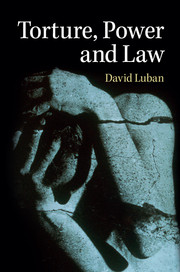Book contents
- Frontmatter
- Dedication
- Contents
- Preface
- Acknowledgments
- I Downgrading rights and expanding power during post-9/11 panic
- II The ticking bomb as moral fantasy and moral fraud
- III The evils of torture
- IV Complicity in torture
- 8 The torture lawyers of Washington
- 9 Tales of terror: lessons for lawyers from the “war on terrorism”
- 10 An affair to remember
- Main index
- Index of legal authorities
- References
9 - Tales of terror: lessons for lawyers from the “war on terrorism”
Published online by Cambridge University Press: 05 September 2014
- Frontmatter
- Dedication
- Contents
- Preface
- Acknowledgments
- I Downgrading rights and expanding power during post-9/11 panic
- II The ticking bomb as moral fantasy and moral fraud
- III The evils of torture
- IV Complicity in torture
- 8 The torture lawyers of Washington
- 9 Tales of terror: lessons for lawyers from the “war on terrorism”
- 10 An affair to remember
- Main index
- Index of legal authorities
- References
Summary
An astonishing feature of the “global war on terrorism” (GWOT) waged by the United States and its allies against Al Qaeda is the prominent role played by lawyers, civilian and military, representing both the US government and the people it has captured. The conduct of these lawyers has been a topic of surpassing interest to many both in and out of the legal profession since the first “torture memos” were released in 2004. It is a subject of international, not merely parochial, interest. I will discuss the “torture lawyers,” but also lawyers who represent the prisoners. Although most of these are Americans, not all of them are. Some of the leading Guantánamo defense lawyers come from the London-based organization Reprieve. One lawyer I want to discuss, Major Dan Mori, of the US Marines, became a minor celebrity in Australia through his representation of David Hicks. The laws at issue in these cases are by and large international law; and, of course, Guantánamo has become an international symbol of the rule of law and its absence, a point central to the debate.
Lawyers and the torture team
In 1975, Richard Wasserstrom published a paper that arguably inaugurated the modern philosophical discussion of legal ethics. The paper was titled “Lawyers as Professionals: Some Moral Issues,” and it began with the striking assertion that “at best the lawyer’s world is a simplified moral world; often it is an amoral one; and more than occasionally, perhaps an overtly immoral one.”
- Type
- Chapter
- Information
- Torture, Power, and Law , pp. 254 - 270Publisher: Cambridge University PressPrint publication year: 2014



